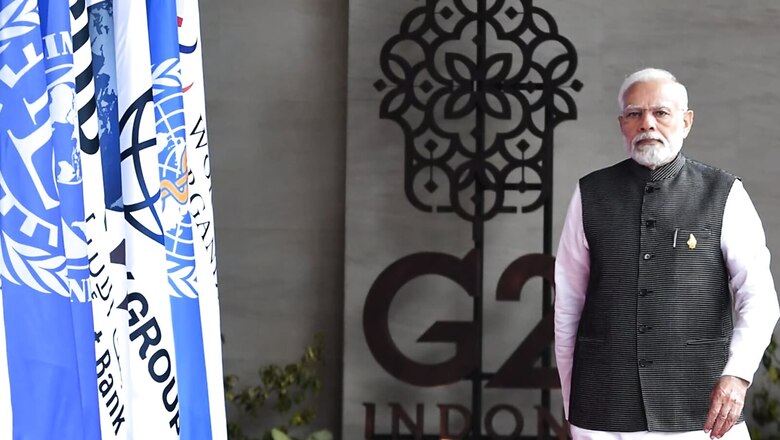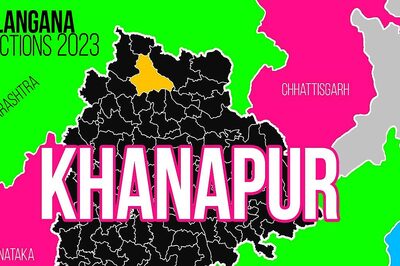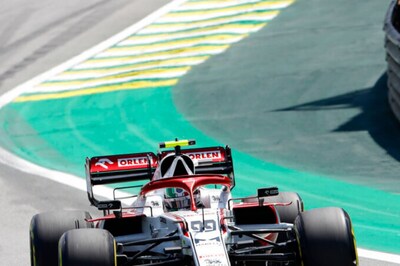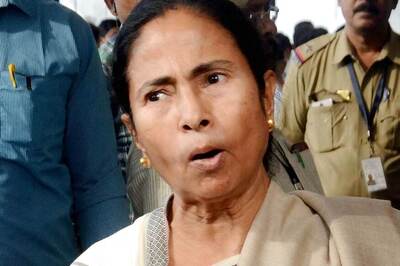
views
India’s presidency of G20 comes at a time when, as Prime Minister Narendra Modi said at the closing session of the Bali summit, the world is simultaneously grappling with geopolitical tensions, economic slowdown, rising food and energy prices, and the long-term ill-effects of the Covid-19 pandemic.
The Ukraine conflict, pitting the US and Europe against Russia, seems like Cold War redux. The endgame is not clear at this moment. It is likely that the conflict will continue through the course of India’s G20 presidency, with all its attendant consequences at the global level that we see already in food, fertiliser and energy shortages, threat of famine in parts of Africa, disrupted supply chains and payment systems, the uncertainties flowing from secondary sanctions on countries seen as violating America’s Russia-related sanctions. These have been imposed unilaterally by the US and Europe, disregarding their impact on developing countries.
These developments are against the purpose and spirit of not only the G20 but also the G7. The latter was set up by the most advanced developed economies to stabilise global growth and finance so that their prosperity could be assured by managing the global financial system to that end. After the 2008 financial crisis that risked exposing the world, developed and developing, to the consequences of the mismanagement of the US financial system, the G20 was created to ensure policy coordination involving a wider set of major economies in order to stem the crisis and preserve the system that the West had structured.
The economic and financial sanctions on Russia led initially by the US and Europe and following the Russian military intervention in Ukraine by the G7 as a whole disregard and undermine the objective of creating the G20, as all these steps were taken without consulting the larger group. It appears that with a solidified transatlantic alliance, shared geopolitical objectives vis a vis Russia, coupled with anti-globalisation sentiment and more nationally oriented economic policies, the G7’s priority now seems to be to pursue their geopolitical interests even at the cost of geo-economic ones. In that perspective, the G7 is likely to become a more important forum for the West to seek to coordinate economic and financial policies at the global level.
This is no longer possible though. With China as the second largest economy, the biggest exporting country, the G7 cannot operate as before. The economic dependence of the West and Japan on China limits the G7’s capacity to shape on its own the global economic and financial structures. The conflict between geopolitics and geo-economics is most evident in the case of G7’s relations with China, as the latter is the biggest economic partner of most of these countries even while the US has declared it as its principal adversary. In September this year, the G7 countries too seem to have agreed to take a tougher, more coordinated stance towards China. Germany announced that it would persuade the EU to “establish a more robust trade policy toward China and respond as Europeans to the coercive measures that China takes to protect its economy”. Yet, German Chancellor Scholz was the first G7 country leader to visit China in November with a large business delegation and announced that “China remains an important business and trading partner for Germany and Europe — we don’t want to decouple from it”.
The fact that Saudi Arabia not only refused US pressure to raise oil production to control the oil price rise that was impacting the global economy but actually agreed within OPEC to cut oil production shows the gap that has developed in a critical area between G7 objectives and that of a G20 member. Moreover, Saudi Arabia has evinced interest in joining BRICS, which in itself may not be that significant as countries like India and Brazil are part of BRICS, but it shows an erosion of the capacity of the G7 to set the global economic and financial agenda on their own and obtain the acquiescence of the other 13 G20 members.
The other challenges that India’s G20 presidency will need to grapple with are the rising inflationary trends globally, which the Fed’s monetary policies have exacerbated. On another front where the international community has enormous shared stakes, developments have not been favourable for our presidency. With regard to climate change, the results of COP27 in Egypt have been meagre, with serious unresolved gaps between the developed and developing countries on issues of finance and technology.
The West is determined to raise the Ukraine issue on all international forums and castigate Russia. The G20 is an economic and financial forum, not a security one, and therefore ought not be used for political battles. But then, with countries now hostile to each other part of G20, political score settling would be inevitable. The great risk was that if the G20 also ended without a communiqué as has been the case of G20 meetings at the Finance and Foreign Ministers level, it would have well meant the demise of the group.
At Bali, therefore, the pressure for a consensus language would have been immense, and the language eventually agreed to is weighed in West’s favour. Russia acquiesced to this, with the qualification in the text that the parties reiterated their national positions as expressed in various fora, including the UN Security Council and the UNGA which passed a resolution deploring in the strongest terms Russia’s aggression against Ukraine, etc. As the UNGA resolution is an international fact, the Russian side let it pass. The declaration, while carrying a balancing qualification, albeit weak, that “other views and differing assessments of the situation and sanctions” were expressed, says: “Most members strongly condemned the war in Ukraine and stressed it is causing immense human suffering and exacerbating existing fragilities in the global economy-constraining growth, increasing inflation, disrupting supply chains, heightening energy and food security, and elevating financial security risks”. The text reflected concerns expressed in the group about bringing in security issues when it says, “Recognising that the G20 is not the forum to resolve security issues, we acknowledge that security issues can have significant consequences for the global economy.”
India has been credited, publicly by the US, with promoting a consensus on Ukraine at the G20 summit. At Bali, PM Modi recalled that he had repeatedly said that a way had to be found to return to the path of ceasefire and diplomacy in Ukraine. This has been reflected in the paragraph in the G20 communiqué which notes that the “peaceful resolution of conflicts, efforts to address crises, as well as diplomacy and dialogue, are vital. Today’s era must not be of war”. The last is a line (slightly tweaked in the Bali Declaration) that Prime Minister Modi used in conversation with President Putin at Samarkand, one that has reverberated internationally.
Modi and his team would undoubtedly have worked hard to promote a consensus text because failing to do so would have jeopardised the future of India’s own presidency and the ambitions we have to use it to showcase India. The PM and his team want to use the country to give participants, in Modi’s words, “full experience of India’s amazing diversity, inclusive traditions, and cultural richness”, wishing that all G20 members will participate in this unique celebration in India, the ‘Mother of Democracy’, as well as leave a mark of our ideas and priorities on global discussions relating to public digital goods and digital infrastructure, climate action, climate finance and technology collaborations, sustainable, affordable and inclusive energy transition, accelerated progress on sustainable development goals, women led development and multilateral reforms.
Kanwal Sibal is former Indian Foreign Secretary. He was India’s Ambassador to Turkey, Egypt, France and Russia. The views expressed in this article are those of the author and do not represent the stand of this publication.
Read all the Latest Opinions here




















Comments
0 comment